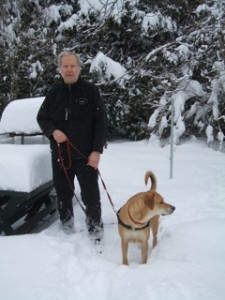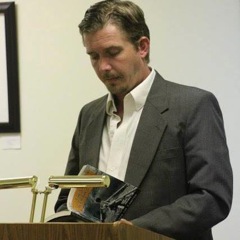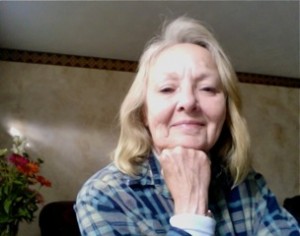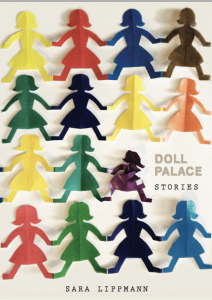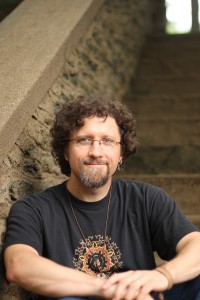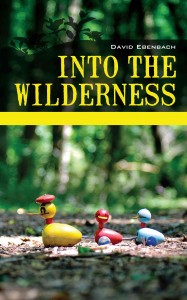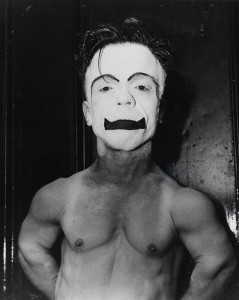 We are pleased to welcome Michael Czyzniejewski to this month’s Writers on Craft. Michael Czyzniejewski is the author of three fiction collections: I Will Love You for the Rest of My Life: Breakup Stories (Curbside Splendor, 2015), Chicago Stories: 40 Dramatic Fictions (Curbside Splendor, 2012), and Elephants in Our Bedroom (Dzanc, 2009). In 2010, he received a fellowship from the National Endowment for the Arts. He now serves now as Editor of Moon City Review and Moon City Press and teaches at Missouri State University.
We are pleased to welcome Michael Czyzniejewski to this month’s Writers on Craft. Michael Czyzniejewski is the author of three fiction collections: I Will Love You for the Rest of My Life: Breakup Stories (Curbside Splendor, 2015), Chicago Stories: 40 Dramatic Fictions (Curbside Splendor, 2012), and Elephants in Our Bedroom (Dzanc, 2009). In 2010, he received a fellowship from the National Endowment for the Arts. He now serves now as Editor of Moon City Review and Moon City Press and teaches at Missouri State University.
What do you read when you despair at the state of either your work or modern literature—any “go to” texts?
I despair about my work, quite a bit actually, as I think any writer does, always second-guessing, always wondering where this or that is going, if it’s going to fly. I’m good, though, on the state of modern literature, and never, ever think that it’s in trouble, it’s going in the wrong direction, or ain’t what it used to be. But back to me and my own crises, I still go to the stories and writers that made me want to write, that formed me, just to remind myself how great stories are and how much I love them. I’ve said this in other interviews, but my crush on A Good Man Is Hard to Find is never-ending, so that’s always at hand. Barthelme’s 40 Stories—that fits in my bag better than 60 Stories—and I carry it around a lot, my Catcher in the Rye, sans assassination plans. I’ve been living in and around the new and selected Milhauser that came out recently. The two books that most specifically formed my voice and style, too, The Girl in the Flammable Skirt and CivilWarLand in Bad Decline. Those are both pretty perfect books.
If you could give just one piece of advice to emerging authors about editing that has served you well, what would it be?
Editors really want to like your work. I think most submitters, the newer writers, think the opposite, that editors sit in a room with piles and piles of manila envelopes, looking for one poorly placed adverb or one bad simile so they can move on to the next story. Now it’s the queue in Submittable or one of the other programs, their finger on the DECLINE button, a hair trigger. In my experience, it’s the opposite: I’m hoping that every time I open a file, it’s a great story and I can show it to my staff, talk them into it because I read it, ate it up, and can’t wait for others to read it, too. And I think a lot of my colleagues in editing think the same way. It’s why I, and a lot of editors, got into this, just to be able to read great stories.
How has your perception of what you “do” with your work changed as you have continued to write?
Interestingly, I think it’s more cyclical than a change, especially with this new book, the breakup stories, because those are similar to the stories I wrote in my first book, Elephants, and some of those stories are fifteen years old. My stories are leaner now, more attention paid to style and differentiating style, but a lot of the themes are similar. My second book, in between, was a project, those Chicago monologues, written from famous POVs. But this new book, it attacks the same themes that I was writing about when I started writing and publishing.
Since I turned this new book over to the publisher on September 1, I’ve made a concerted effort to redesign myself, to do something else. I like this new book and I like my first book, but I’ve done that now, a couple of times, stories about relationships, very domestic stories, what love and sex make you do, how those things change you. I’ve made a pact with myself to not write another story that focuses on relationships, or one that takes place in anyone’s living space. Been there, done that.
The problem is, where do I go from there? I haven’t finished anything since them, partly because I’ve been busy with Moon City Press, but mostly because I’ve been trying to figure out where to go next. I’d like to work on longer, more developed stories, for one. I teach from Pushcart, BASS, and O. Henry and I like a lot of those stories, but most of them would be twenty pages or more in manuscript form. The longest story in my new book was nine. I’d like to take a shot at some extended narratives. Oh, and write a novel. I’m well into one and should probably finish it.
What do you feel is the purpose of literature?
My answer might not be popular, but I think the main purpose of literature is to entertain us, for a reader to find what they like to read, whether it’s Donna Tartt or some manga thing that has a million exclamation points. That’s what I get out of it, a challenging diversion, like a crossword puzzle or watching Jeopardy!, something I like to do to pass the time, intellectual, but fun, in between reading students’ stories/submissions and watching sports/mindless TV.
But it’s not that easy, to just be entertained, as I’m also a writer, so I’m never only being entertained. I’m picking up on techniques, watching the arc of the story take form, predicting what will happens, seeing how characters are introduced, how people talk to each other. So as much as it’s entertainment, it’s also research. I try to get one thing from everything I read, something that’s memorable, something I can steal.
But that’s for me. I know literature does a lot of other things for other people. Just one example: It teaches people about places and events, and that’s great. But I’m not going to pick up a novel about Tegucigalpa because I want to learn about Tegucigalpa. That might happen as a peripheral benefit, but I’m not setting out to find that. I watch the news and surf the Internet when I want to know things.
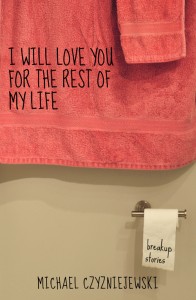 As a human being, what is the best advice you have to offer?
As a human being, what is the best advice you have to offer?
Don’t lie. It hurts people and makes you into someone else. It makes you a liar, for one, but also posits you as someone you’re not, someone you don’t deserve to be or someone you don’t want to be. I used to lie to people, like half my life ago, to make myself seem more important or impressive, and that’s so pathetic and betraying. Plus, if you’re honest all the time, it helps you aspire to be the person that you thought you had to lie to be. I made it a practice to not lie twenty years ago and couldn’t be happier with who I am. It’s a burden to lie, and I’m happy to be free of that burden.
Besides, I write fiction, and that’s enough lying right there.
I notice you use first-person narrators quite a bit in your stories, though you also alternate with other POVS at whim. What’s the allure with first person POV for you—since this seems one of your favorite modes to write from? Is there any difference between how you feel writing a story in third person and first, for example? Different elements you might bring to the more confessional narratives first person use sometimes implies?
I think it has to do with unreliability, more than anything else. I do believe in the close third-person limited unreliable narrator, the third person who takes on the characteristics of the unreliable person they’re chronicling, but for the most part, these stories in this new book are all about betrayals and dishonesty and naiveté, and the best way to demonstrate that, I think, is to put the reader in the mindset of that character, that person making the mistake as they’re making it, but never realizing it. I guess that’s my gateway into story.
That’s not to say I don’t take notice of this overabundance, that I didn’t write third-person stories just to offset all the first. I like that voice, too, and as I grow as a writer, referring back to your previous question, I think I’m understanding what that voice can do for a narrative, the perspective, the neutrality. The novel I’m working on, for example, is in third, because I just didn’t want to inflict first person on a reader for 250 pages. Unreliability can only be taken so far before the person moves beyond unreliable and is just bad. Or dumb. Most of the power of using an unreliable narrator is how the reader doesn’t know they’re reading an unreliable narrator, maybe not until the story’s over.
I love how freely you experiment with form and humor in some of your work. I’m thinking, in particular, of “The Braxton-Carter-Vandamme-Myers-Braxton-Carter Divorce: An Outline” and “The Plum Tree” pieces in your new book, which are both so structurally playful and funny in their own ways. Do you often experiment with unusual structure? Do you tend to do this more often with flash fiction than full-length stories?
I was really inspired by a couple of other books of short shorts, The Museum of the Weird by Amelia Gray and Don’t Kiss Me by Lindsay Hunter, books that are so remarkable, not just for their story-telling, but for how they form the genre, hold nothing back. When I started putting together this book, I saw what they did and remembered something, that one of the great things about short shorts is that you can do/try anything, mainly because writers should do that, but with short shorts, if you experiment, try something like a voice or a form or a syntactical experiment, the reader only has to endure it for a couple of pages. Short shorts are made for outline stories and lists and overwritten prose and crazy voices and whathaveyou; If it doesn’t work, it’s not like the reader invests too much time into it. Some of that stuff works better in small doses, like the outline story, because I don’t give the reader time to get tired of it or see it as gimmick. Could you imagine a novel, or even a fifteen-page short story, written like that? So, my purpose when I head into a short is to try something new, pull it off one time, then move on, like how a band will try a weird cover, or let the drummer sing, during the encore, because, why not?
What’s recently released or in the pipeline for your readers? Give us a sneak peek.
From me? Well, the book’s coming out on March 15, and that can be preordered at places like Amazon, or even better, the Curbside Splendor page. Some of the stories are coming out in journals beforehand. I’m so happy to have working coming in places like Pleiades and River Styx, as they’re magazines that I’ve read for a long time, have sent to for a long time, and I’ve finally caught their eye.
But there are so many books by so many great writers. Just glad to be in the mix.
________________________________
Writers on Craft is hosted by Heather Fowler, who cares about writing. She does a lot of it. Visit her profile on Fictionaut or see here for more: www.heatherfowlerwrites.com.


